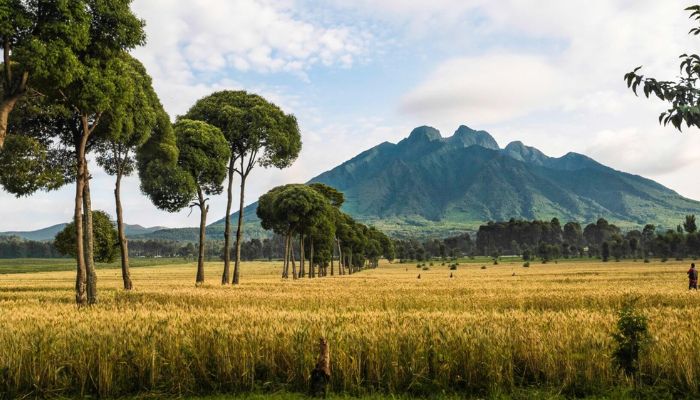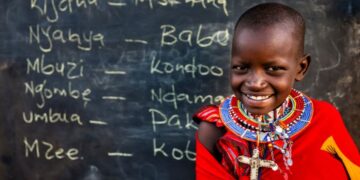Rwanda is a landlocked country that lies south of the Equator in east-central Africa and is bordered by Uganda, Tanzania, Burundi, and the Democratic Republic of the Congo. She has a population of about 12 million people based on a 2021 population census projection, and her governmental affairs are run by President Paul Kagame, who assumed office on April 22, 2000.
Intriguing Facts About Rwanda You Need To Know
1. She Got Her Name From A Kinyarwanda Verb
Rwanda derived its name from the Kinyarwanda verb “Kwanda,” which translates to “expansion” in English after King Gihanga founded it in the 15th century. According to various accounts, the name stems from the king’s annexation of many neighboring territories to establish the Kingdom of Rwanda.
2. The Country Was Colonized By Germany And Belgium
Rwanda has two colonial masters: Germany and Belgium. Germany first colonized the country in 1897 as part of German-East Africa. During the period, Germany ruled indirectly through an existing political structure put in motion by the Mwami. In 1916, during World War 1, Belgian colonial forces took control of the territory, and by 1923, the League of Nations had given the country to Belgium. More than three decades later, Rwanda gained independence on July 1, 1962, a month after the United Nations General Assembly terminated the Belgian Trusteeship Agreement.
3. Rwanda’s Capital And Largest City, Kigali, Was Founded In 1907
Besides being the country’s capital city since its independence from Belgium in 1962, Kigali is her most prominent city. It was founded in 1907 by German colonial resident Richard Kandt, who chose her due to her central location, views, and security. Furthermore, it has a population of 1.1 million inhabitants according to the 2012 census, but it is projected to reach 1.3 million by 2025.
4. Rwanda’s Volcanoes National Park Is The Home Of The Largest Population Of Mountain Gorillas In The World

Volcanoes National Park in northwestern Rwanda is the country’s main tourist haven. More than half the population is found here of the more than a thousand endangered mountain gorilla species in the world. Additionally, the park is home to golden monkeys, spotted hyenas, buffalos, elephants, black-fronted duikers, and bushbucks.
The park was extended into Rwanda and the Belgian Congo in 1929 and was divided in the 1960s when the two gained independence.
5. Hutu and Tutsi Are The Major Ethnic Groups In The Country
The largest ethnic groups in the country are the Hutus and the Tutsi, with the former accounting for 85 percent and the latter making up 14 percent of Rwanda’s population. The remaining 1 percent is for the minority group, Twa. Based on this, the Hutus remain the largest ethnic group in Rwanda. Besides, President Paul Kagame is a Tutsi.
See Also-10 Safest African Countries In 2023
6. The Country Has Four Official Languages
Kinyarwanda, French, English, and Swahili are the four recognized official languages in the country. Kinyarwanda is Rwanda’s national and most spoken language, followed by English, which has 15 percent of speakers, while French and Swahili are spoken by 6 percent and 1 percent of the population, respectively.
Besides these, the German language was used during the colonial period.
7. It Has Never Been To The FIFA World Cup
Rwanda’s national football team, nicknamed Amavubi (The Wasps), has yet to appear on the FIFA World Cup stage. On the continental level, the country qualified for the African Cup of Nations on one occasion at the 2004 edition in Tunisia. At the competition, she lost 2-1 to the host in her opening game, a 1-1 all-draw with Guinea, and a 1-0 win over DR Congo, but failed to go beyond the group stage after Tunisia and Guinea progressed to the last eight.
Outside of football, the country made its first Olympic appearance at the 1984 Summer Olympics in Los Angeles, California, United States. Since then, she has competed in nine Summer Olympic tournaments, such as Seoul 1988, Barcelona 1992, Atlanta 1996, Sydney 2000, Athens 2004, Beijing 2008, London 2012, Rio de Janeiro 2016, and Tokyo 2020. Despite this, it has never won any Olympic medals, but Jean de Dieu Nkundabera won the country’s first Paralympic bronze medal in athletics at the 2004 Paralympics in Athens.
8. An Estimated 800,000 People Were Killed, And 2 Million Were Displaced During The 1994 Rwandan Genocide
The Rwandan Genocide, which took place between April 7 and July 15, 1994, during the Rwandan Civil War, saw the killing of approximately 800,000 people, mostly the Tutsi and some moderate Hutu and Twa, by Hutu militias. However, there are arguments that the figures are around 500,000 to 662,000.
According to the United Nations High Commission for Refugees (UNHCR), the number of those who fled to neighboring countries during and after the genocide was estimated to be more than 2 million. This ushered in a large-scale humanitarian crisis as 1.2 million people escaped to Zaire, 580,000 to Tanzania, 270,000 to Burundi, and 10,000 to Uganda. Besides, 1.5 million people were internally displaced.
9. Christianity Is Her Largest Religion
The largest religion in Rwanda is Christianity. More than 90 percent of her population are adherents. According to the 2012 census, Catholics represent 43.7 percent, protestants 37.7 percent, and Seventh-day Adventists 11.8 percent. Moreover, 2 percent are Muslims, while 0.2 percent claimed to have no religion, while the traditional religion with no significant followers holds influence.
These figures have appreciated over the years.
10. Two Interim Presidents And Four Presidents have ruled Rwanda Since The Office Was Created In 1961
Two interim presidents and four presidents have ruled the country since the “office of the president” was created in 1961 during the Rwandan Revolution.
Dominque Mbonyumutwa served as the country’s first interim president for nine months, from January 28, 1961, to October 28, 1961. He died on July 26, 1986, at the age of 65.
The first elected president of Rwanda was Grégoire Kayibanda. He was in power from 1962 until he was overthrown in a coup d’état in 1973 by his defense minister, Juvénal Habyarimana. He passed away on December 15, 1976, at 52.
Kayibanda was succeeded by Juvénal Habyarimana, who served as the country’s second president from 1973 to 1994. He was assassinated on April 6, 1994, after his private jet was shot down near the Kigali International Airport.
Théodore Sindikubwabo became Rwanda’s second interim president during the genocide period from April 9 to July 19, 1994. He died in March 1988 at about the age of 70.
Pasteur Bizimungu was the third president of the landlocked country. He became president on July 19, 1994, until his alleged forced resignation on March 23, 2000.
After Bizimungu, Paul Kagame, who served as RPF commander during the Rwandan civil war and genocide and also as Vice President and Minister of Defense, was elected as the country’s fourth and current President in April 2000. He was reelected in 2003, 2010, and 2017.




















